Caps, Texas Comedy Club
https://rentry.co/4kfnyvq7
3/15/2025
Category: Comedy
-
Caps, Texas Comedy Club
-
Carbon, Texas Comedy Club
Carbon, Texas Comedy Club
https://anotepad.com/notes/5meg8jrr
3/15/2025 -
Carlton, Texas Comedy Club
Carlton, Texas Comedy Club
3/15/2025 -
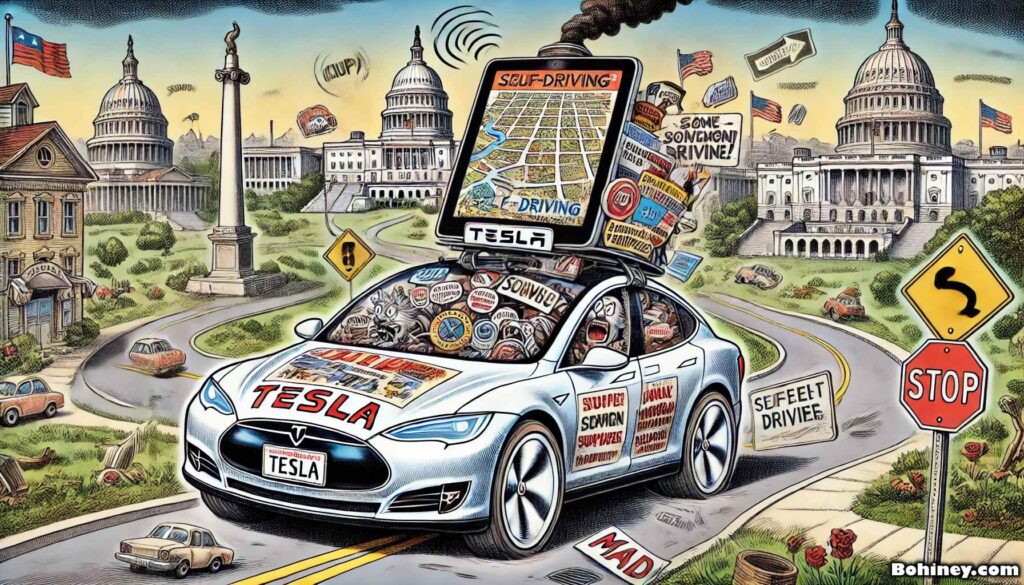
Adam Schiff’s Tesla
Go to Source
Author: Alan NafzgerSOURCE:
Europe
Asia
Canada
Latin America
Africa -

Perpetual Government Shutdown
The Perpetual Government Shutdown: A Exploration of a Nation Running on ‘Essential’ Services Alone
Abstract: This piece delves into the hypothetical scenario where the U.S. government operates under a perpetual shutdown, maintaining only ‘essential’ services. By examining the potential benefits and addressing anticipated criticisms, we aim to highlight the absurdity and practicality of such a governance model.
Introduction
Imagine a United States where Congress, in a rare moment of unanimous agreement, decides to perpetually shut down the federal government, preserving only ‘essential’ services. No more budget battles, no more partisan bickering—just a streamlined government focusing solely on what truly matters. While this notion might seem far-fetched, exploring its implications offers a humorous yet insightful perspective on the current state of governmental affairs.
Pros of a Perpetual Government Shutdown with Only Essential Services
-
Fiscal Responsibility and Budgetary Savings
Without the need to fund ‘non-essential’ services, the federal budget could see significant reductions. This leaner government approach might lead to decreased national debt and reduced taxpayer burden. Historical data indicates that during past shutdowns, certain expenditures ceased, leading to temporary fiscal savings.
-
Enhanced Efficiency in Government Operations
Focusing solely on essential services could streamline bureaucratic processes, leading to faster decision-making and implementation. For instance, agencies deemed critical, such as the National Weather Service and parts of NASA, have continued operations during past shutdowns, ensuring public safety and essential research without interruption.
-
Increased Public Appreciation for Government Functions
With only essential services in operation, citizens might develop a greater appreciation for the critical roles the government plays, such as national defense, air traffic control, and emergency response. This heightened awareness could foster a more informed electorate.
-
Promotion of Private Sector Solutions
The absence of non-essential government services could encourage private enterprises to fill the void, fostering innovation and competition. For example, during the 2013 shutdown, private entities stepped in to maintain certain public services, showcasing the potential of public-private partnerships.
-
Reduction in Political Gridlock
A perpetual shutdown eliminates the annual budgetary standoffs, allowing Congress to focus on legislative matters beyond appropriations. This shift could lead to more productive sessions and comprehensive policy discussions.
-
Empowerment of State and Local Governments
With the federal government limiting its role, state and local governments might assume greater responsibility, leading to more tailored and effective governance that aligns with regional needs.
Refutation of Expected Arguments Against a Perpetual Government Shutdown
-
Economic Disruptions
Critique: Opponents argue that government shutdowns harm the economy, citing the 2013 shutdown that allegedly took $24 billion out of the economy and reduced GDP growth by 0.6%. en.wikipedia.org
Rebuttal: While short-term disruptions are plausible, a planned and perpetual shutdown would allow markets and industries to adjust accordingly. The private sector’s adaptability could mitigate long-term economic impacts.
-
Public Inconvenience and Service Gaps
Critique: The cessation of non-essential services could lead to public inconvenience, such as closed national parks and delayed regulatory approvals.
Rebuttal: The definition of ‘non-essential’ is subjective. Services truly vital to public welfare would continue, and the private sector could innovate to provide alternatives for others.
-
Unemployment and Furloughed Workers
Critique: A shutdown could result in massive furloughs of federal employees, leading to increased unemployment and economic strain.vox.com
Rebuttal: Transition programs and the growth of private sector opportunities could absorb the workforce, promoting a more dynamic employment landscape.
-
National Security Concerns
Critique: Reduced government operations might compromise national security and emergency preparedness.
Rebuttal: Essential services, by definition, include national defense and emergency response, ensuring that security remains uncompromised.
-
Erosion of Public Trust in Government
Critique: A perpetual shutdown could signal governmental dysfunction, eroding public trust. AP News
Rebuttal: On the contrary, a leaner, more efficient government focusing on essential services might restore faith in its efficacy and purpose. AP News
Conclusion
While the concept of a perpetual government shutdown, maintaining only essential services, is satirical in nature, it prompts critical reflection on the size, scope, and efficiency of government operations. By examining the potential benefits and addressing common criticisms, we can engage in a broader discussion about optimizing government functions to better serve the public interest.

BOHINEY NEWS — A vibrant satirical scene of a famous national park renamed as ‘Geyser World, Sponsored by BleachBit.’ Park rangers wear uniforms covered in corporate… – bohiney.com3
Scenario Where the Government is Perpetually Shut Down
Exploring a scenario where the government is perpetually shut down, maintaining only ‘essential’ services, offers a rich vein of satirical observations. Here are 15 humorous takes on such a situation:
-
Congressional Job Fair: With non-essential services halted, members of Congress might find themselves at job fairs, awkwardly explaining how their previous experience in filibustering qualifies them for customer service roles.
-
National Parks Privatized: Yellowstone becomes “Geyser World,” complete with corporate sponsorships and a mascot named “Bubblin’ Benny.”
-
DMV Efficiency: The DMV, now considered non-essential, is replaced by a smartphone app. Wait times drop from hours to nanoseconds, but users nostalgically miss the sticky chairs and outdated magazines.
-
IRS Bake Sales: To fund operations, the IRS holds nationwide bake sales. Auditors turn pastry chefs, offering “Tax Tarts” and “Deduction Donuts.”
-
Lobbyists’ Crisis: With fewer officials to influence, lobbyists experience an existential crisis, leading to support groups where they reminisce about the good old days of excessive earmarking.
-
C-SPAN’s New Content: Lacking live congressional sessions, C-SPAN resorts to broadcasting dramatic readings of the Federal Register, gaining a cult following among insomniacs.
-
White House Airbnb: To cover maintenance costs, the White House is listed on Airbnb. Guests can stay in the Lincoln Bedroom, but must promise not to issue executive orders in their sleep.
-
Postal Service Renaissance: With mail delivery deemed non-essential, pigeon breeding becomes a trendy hobby as citizens rediscover the art of carrier pigeons.
-
Public Reaction: A national poll reveals that 60% of Americans didn’t notice the shutdown, while 30% thought it had been shut down for years, and 10% believed “government” was a new Netflix series.
-
Emergency Services Overload: Firefighters and police officers, now the face of all government services, are overwhelmed with requests ranging from rescuing cats to fixing Wi-Fi connections.
-
Education System Overhaul: With the Department of Education closed, parents turn to YouTube tutorials for homeschooling, resulting in a generation proficient in makeup tutorials and unboxing videos.
-
Infrastructure DIY: Citizens adopt a DIY approach to infrastructure, with neighborhood committees organizing “Pothole Filling Fridays” and bridge-building potlucks.
-
Economic Boom in Black Markets: Entrepreneurs thrive by offering black-market bureaucratic services, like underground permitting offices and speakeasy-style zoning boards.
-
State Governments’ Glory: State governors, seizing the opportunity, declare themselves “Supreme Leaders” of their territories, leading to the Great Cheese War between Wisconsin and California.
-
National Anthem Remix: Artists release a new version of the national anthem titled “Home of the Brave, Land of the Unregulated,” climbing to the top of the charts.

BOHINEY NEWS — A humorous depiction of a deserted DMV office, covered in dust and cobwebs, with an old banner over the entrance reading, ‘Closed Due to Obsolescence… – bohiney.com6 What the Funny People Are Saying…
-
“So, the government’s shut down, huh? Only essential services running. I guess that means Congress finally found a way to improve their approval ratings—by not working!” — Ron White
-
“What’s the deal with ‘non-essential’ government employees? If they’re non-essential, why are we paying them? It’s like having a lifeguard at the Olympics—nice to have, but really?” — Jerry Seinfeld
-
“A perpetual government shutdown? That’s not a crisis; that’s a libertarian’s birthday wish come true. No regulations, no oversight—just you, your bootstraps, and a complete lack of infrastructure. Happy now?” — Jon Stewart
-
“I refuse to join any government that would have me as a non-essential employee. If they’re not working, neither am I!” — Groucho Marx
-
“You look at this shutdown, and you think, ‘Finally, a diet that works!’ The government’s shedding pounds of bureaucracy like it’s getting ready for swimsuit season.” — Billy Crystal
-
“With the government shut down, I guess it’s up to us comedians to provide essential services. Need a passport? Here’s a joke instead. It’s just as useful.” — Adam Sandler
-
“The government’s closed, and suddenly everyone’s panicking. Relax! It’s like when your in-laws leave after Thanksgiving—you finally get some peace and quiet.” — Jackie Mason
-
“So, the government’s shut down, and people are worried about essential services. Honey, if you think the government’s essential, you’ve clearly never been to the DMV.” — Sarah Silverman
-
“A perpetual shutdown? Sounds like the plot of a sitcom where nothing happens—oh wait, that’s just C-SPAN.” — Larry David
-
“The government’s shut down, and everyone’s freaking out. Meanwhile, I’m over here like, ‘Welcome to my world!’ I’ve been shutting down unwanted advances since puberty.” — Roseanne Barr
-
“So, the government’s shut down, and only essential services are running. Does that include Tinder? Because I need to know if my date tonight is still happening.” — Amy Schumer
-
“The government’s shut down, and they’re only keeping essential services. So, Netflix is still running, right? Because that’s all I really need.” — Kevin Hart

BOHINEY NEWS — An exaggerated illustration depicting members of Congress standing in an unemployment line. They’re dressed in their usual suits but appear disheveled, holding signs like “Will Legislate for Food” and “Lost: My Relevance.” In the background, a closed Capitol building has a “For Rent” sign, and everyday citizens pass by without noticing, going about their business unaffected. – bohiney.com 
BOHINEY NEWS — A humorous depiction of a deserted DMV office, gathering dust and cobwebs. Outside, people of all ages happily renew their licenses using a user-friendly smartphone app. A banner hangs over the DMV entrance reading, “Closed Due to Obsolescence.” In the foreground, a former DMV employee, now an app developer, enthusiastically promotes the new service to passersby. – bohiney.com 
BOHINEY NEWS — A vibrant scene showing a famous national park renamed as “Geyser World, Sponsored by BleachBit.” Park rangers wear uniforms plastered with corporate logos, and visitors use branded selfie stations. A large billboard advertises the “Old Faithful Geyser, now with 50% more reliability, thanks to BEACHBIT.” – bohiney.com The post Perpetual Government Shutdown appeared first on Bohiney News.
Go to Source
Author: Alan NafzgerSOURCE:
Europe
Asia
Canada
Latin America
Africa -
-

Chuck Schumer’s Master Plan
Go to Source
Author: Alan NafzgerSOURCE:
Europe
Asia
Canada
Latin America
Africa -

The Spy Who Emailed Me, on Google!!!

BOHINEY NEWS –Leaked Obama/Biden Emails!!! (4)… – bohiney.com BREAKING: Leaked Obama/Biden Emails!!!

BOHINEY NEWS –Leaked Obama/Biden Emails!!! (1)… – bohiney.com The post The Spy Who Emailed Me, on Google!!! appeared first on Bohiney News.
Go to Source
Author: Alan NafzgerSOURCE:
Europe
Asia
Canada
Latin America
Africa -
Campo Alto, Texas Comedy Club
Campo Alto, Texas Comedy Club
https://notes.io/wVdGa
3/14/2025 -
Canton, Texas Comedy Club
Canton, Texas Comedy Club
https://anotepad.com/notes/j3kexijj
3/14/2025 -
Caplen, Texas Comedy Club
Caplen, Texas Comedy Club
https://notes.io/wVdGK
3/14/2025 -
High School Introduces Sarcasm 101 To Prepare Students For Real World
High School Introduces Sarcasm 101 To Prepare Students For Real World
-
Higher Education Olympics
Higher Education Olympics
-
Hoda And Jenna
Hoda And Jenna
-
Hollywood Announces All Future Movies Will Be Remakes Of Remakes
Hollywood Announces All Future Movies Will Be Remakes Of Remakes
-
Campbell, Texas Comedy Club
Campbell, Texas Comedy Club
https://rentry.co/x2scmnyh
3/14/2025 -
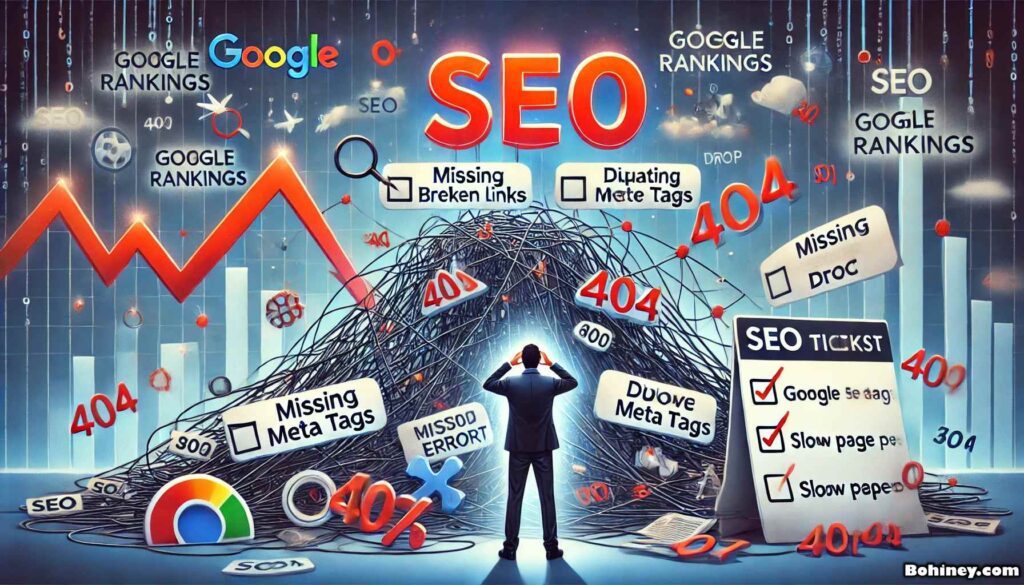
Common SEO Mistakes
Are you sabotaging your SEO efforts? Avoid these blunders – from blaming algorithms to misusing canonical tags – and optimize smarter.
15 Observations on Common SEO Mistakes
(Because Ranking First in Google Doesn’t Mean You’re First in Life)
1. The Obsession with Organic Traffic
SEO “experts” treat organic traffic like a rare and endangered species—like spotting a bald eagle, except instead of majestic wildlife, it’s just a guy named Gary clicking on your blog about “The History of Paperclips.”
“People brag about traffic numbers like it’s their salary. ‘We hit 100,000 visitors this month!’ That’s great, how much did you make? ‘Nothing, but look at this graph—it’s going up!’” — Jerry Seinfeld
2. Ignoring the User Experience
You know that website that looks like it was designed in 1998 by a blindfolded raccoon? Yeah, that one’s not ranking.
“Some websites are so hard to use, they should come with a user manual and a therapist. ‘Alright, step one: Click here. Step two: Cry. Step three: Call for help.’” — Ron White
3. Chasing Short-Term Gains
SEO quick fixes are like crash diets—sure, you lost 10 pounds, but only because you stopped eating solid food and now you’re hallucinating cheeseburgers.
“People love shortcuts. That’s why they try things like keyword stuffing, and why there are 8,000 variations of ‘best pizza near me’ on one page. The problem? Google’s not stupid. Unlike some people.” — Chris Rock
4. Blaming the Mysterious ‘Algorithm’
The way people talk about the Google algorithm, you’d think it was an ancient prophecy, passed down through the ages.
“Google updates their algorithm and suddenly it’s the end of the world. ‘Our rankings dropped overnight! This is an outrage!’ No, Larry, you just built a website with zero useful content and stock photos from 2002.” — Dave Chappelle
5. Misinterpreting Data
SEO reports are a lot like tarot readings—you can make the numbers say whatever you want, but it doesn’t mean your website isn’t cursed.
“People love data, but they don’t know what it means. ‘Our bounce rate is 90%—is that good?’ No, Steve, that means your website is a dumpster fire.” — Amy Schumer
6. Keyword Stuffing
“Best pizza in New York? Best New York pizza? Pizza best in NYC? Best NYC pizza 2024?” This is how websites sound when they try to cheat the system.
“Keyword stuffing is like repeating someone’s name 47 times in a conversation. ‘John, you’re my best friend, John. John, let’s grab a drink, John.’ At some point, John is calling the cops.” — Larry David
7. Neglecting Mobile Optimization
You ever try using a website on your phone and the text is microscopic? You pinch, you zoom, you rotate the screen—and all you get is frustration and arthritis.
“If your website doesn’t work on mobile, congratulations! You’ve successfully locked out 95% of the internet. It’s like opening a store but only letting people in through the air vents.” — Sarah Silverman
8. Overlooking Local SEO
Some businesses think they can skip local SEO. Sure, Bob’s Plumbing will definitely rank worldwide… for no reason at all.
“Ignoring local SEO is like opening a food truck in the middle of the ocean. ‘Come try our tacos!’ …‘Bro, we’re in the middle of nowhere.’” — Ron White
9. Duplicate Content Dilemmas
If you copy and paste your content all over the internet, congratulations—you’ve become the guy who repeats the same joke at every party and wonders why no one laughs.
“Plagiarizing content is like stealing a joke from a comedian—eventually, people notice, and Google is the angry guy in the audience yelling, ‘HEY! THAT’S NOT YOURS!’” — Dave Chappelle
10. The Meta Tag Misconception
Some people think the meta description is a magic spell. “If I just add the right words, Google will shower me with page-one rankings!” Yeah, and if you carry a rabbit’s foot, you’ll win the lottery.
“Meta descriptions are great, but thinking they’ll rank your site is like thinking a great cologne will make you a millionaire. It’s nice, but you still need a job.” — Chris Rock
11. Poor Site Structure
Ever visit a website and feel like you’re lost in an Ikea warehouse? “Where’s the checkout page? WHERE AM I?”
“If your website is impossible to navigate, people leave. It’s like giving someone directions but replacing all the street names with ‘Go left, then panic.’” — Amy Schumer
12. Slow Page Load Times
Some websites load so slowly, you could go make a sandwich, eat it, and come back to find… still nothing.
“If your website takes longer to load than it does to order a coffee, congratulations! You’re officially ranking on Google… page 50.” — Larry David
13. Ignoring Analytics
Not checking analytics is like driving blindfolded. Sure, you’re moving, but who knows where you’re going—or if you’ll survive?
“People ignore their SEO data, then wonder why they’re not making sales. That’s like never checking your bank account, then acting surprised when your card gets declined.” — Sarah Silverman
14. The DIY SEO Approach
Thinking you can master SEO without any training is like thinking you can perform brain surgery because you watched Grey’s Anatomy.
“DIY SEO is like trying to fix your own car with a YouTube tutorial. ‘I just need a wrench and some confidence!’ No, you need a mechanic.” — Chris Rock
15. Failing to Update Content
Leaving outdated content on your website is like having a MySpace page in 2024—just sad.
“‘We don’t update our blog, but it still ranks, right?’ Yeah, and I still fit into my high school jeans. It’s called denial.” — Ron White
Final Thought: SEO is a Comedy, Not a Science
SEO is part strategy, part luck, and mostly just hoping Google doesn’t change the rules while you’re asleep. One thing’s for sure—if you don’t keep up, your website will be the digital equivalent of a Blockbuster Video.
“SEO is like fashion—what worked in 2010 looks ridiculous now. Nobody’s wearing SEO bell-bottoms anymore, Steve.” — Jerry Seinfeld
This article is a 100% human collaboration between two sentient beings—the world’s oldest tenured professor and a 20-year-old philosophy major turned dairy farmer.

BOHINEY NEWS — A wide digital illustration of common SEO mistakes a website visualized as a tangled web of broken links, duplicate content floating around, and a … – satire.info 
BOHINEY NEWS — A chaotic office scene where a frustrated digital marketer looks at a low-ranking website on a laptop screen. The screen shows a website with broken l… – satire.info 
BOHINEY NEWS — A concept illustration of common SEO mistakes a website represented as a tangled web of broken links, duplicate content floating around, and a large … – satire.info The post Common SEO Mistakes appeared first on Bohiney News.
Go to Source
Author: Alan NafzgerSOURCE:
Europe
Asia
Canada
Latin America
Africa -
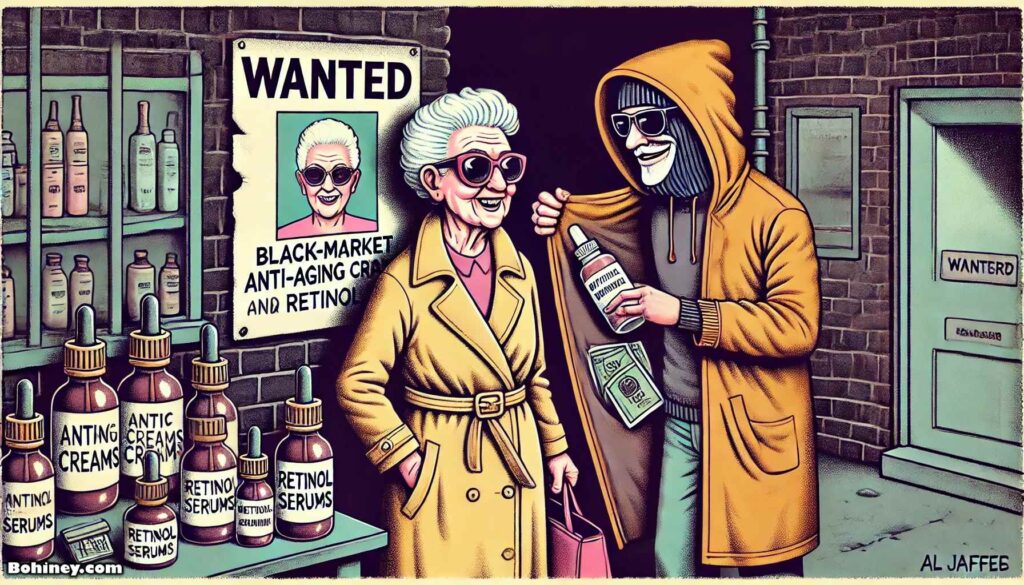
Age Verification Laws & the Skincare Market
Go to Source
Author: Alan NafzgerSOURCE:
Europe
Asia
Canada
Latin America
Africa -
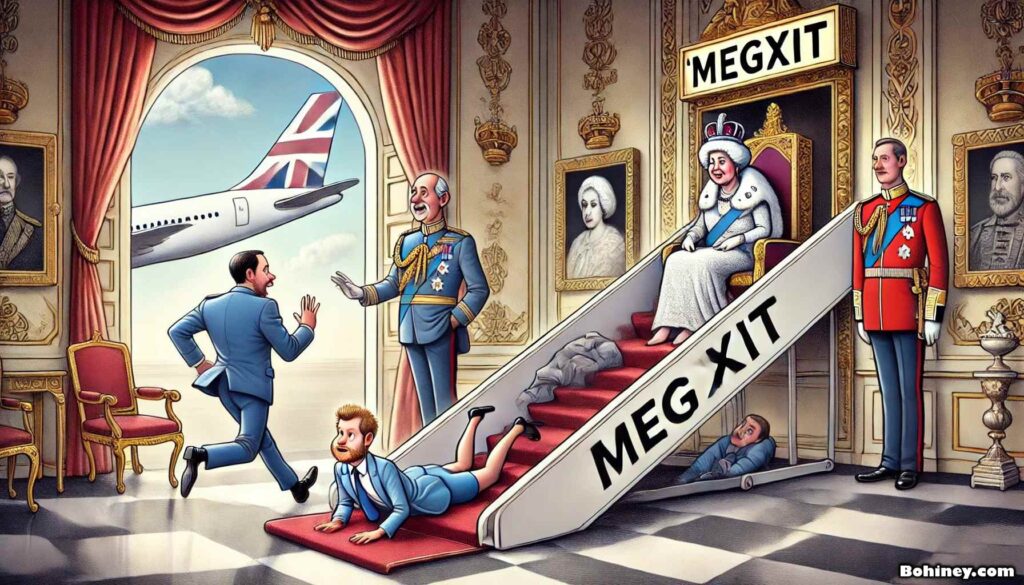
King Charles’ Private Diary
King Charles’ Private Diary Leaked: 74 Years of Royal Whining, Woes, and Wistfulness
“The Crown Is Heavy” – And So Is the Drama
London, March 2025 – In what can only be described as the most British scandal of all time, King Charles III’s personal diary has been leaked to the press, revealing decades of royal grievances, existential musings, and—unsurprisingly—complaints about the press. The diary, spanning from his wedding to Princess Diana in 1981 to his Christmas address in 2023, paints a picture of a man born to reign, but doomed to wait.
The pages, which have miraculously survived tea spills, emotional meltdowns, and an apparent lifelong existential crisis, have been authenticated by top experts in royal whining. As expected, Charles offers a front-row seat to the gilded cage of monarchy, with entries ranging from Shakespearean tragedy to grumpy-old-man energy.
Below, we present the most historically significant excerpts from His Majesty’s musings—unedited, unfiltered, and undeniably royal.
1981: “A Fairytale Wedding (Or So They Say)”
“Married Lady Diana today. Enormous ceremony, half the world watching. Felt like a royal puppet in a very expensive suit. Everyone keeps calling it a ‘fairytale,’ but I feel more like a character in a Shakespearean tragedy. Hoping the press will give us privacy. (Spoiler: They won’t.)”
And thus began the most disastrous marriage in royal history. Charles, whose heart had been pre-booked by Camilla years prior, went into the wedding like a man headed to the gallows. The phrase “fairytale wedding” has since become the gold standard for irony.
Sources inside the palace suggest that Charles spent most of the reception checking his watch, while Diana—unaware of the ticking time bomb that was her marriage—charmed the masses.
1996: “Officially the Most Awkward Divorce Ever”
“It is done. Diana and I are officially divorced. The entire planet seems to have an opinion, most of them unflattering. Can’t imagine why—surely my lifelong love for another woman had no bearing on this? Must remind the staff to remove all paparazzi from the Buckingham Palace gardens. Again.”
Here we have it, folks: a man shocked that his obvious lifelong affair was an issue. The British public, having invested heavily in Diana as their collective emotional support princess, responded to the divorce with shock and betrayal—not toward Diana, but toward the man who somehow made being a prince look miserable.
Even now, it is rumored that should Charles ever find himself lost in the streets of London, he would be guided home by an angry chorus of “We loved Diana more than you!”
1997: “A World in Mourning”
“Diana is gone. The entire nation—no, the world—is grieving. The press, who hounded her to death, are now weeping crocodile tears. The family and I are walking a tightrope of protocol and emotion. William and Harry are devastated. The public wants to blame someone, and, as usual, I am the easiest target. I must endure. The crown demands it.”
One of the more human moments from the diary, Charles acknowledges the unbearable weight of Diana’s death, though his self-awareness levels remain questionable. While he rightly calls out the hypocrisy of the media, the fact that he was seen as the villain of this tragedy remained lost on him.
However, history has since granted him some clemency. In the great villain lineup of the royal family, Charles now stands miles behind Prince Andrew.
2005: “Finally, Camilla”
“Married the woman I have loved for decades. Feels surreal. The public is… adjusting. Slowly. Very slowly. I suspect some still see her as ‘the other woman,’ but I care not. I spent my entire youth being told what to do, who to be, and who to love. At 56, I finally make my own choice. About time.”
A man deeply in love with his mistress finally makes it legal, much to the confusion of the British public. While Camilla has since been grudgingly accepted, it is fair to say that many Britons still use Diana as a personality trait and will never forgive this marriage.
To this day, anyone caught whispering “Queen Camilla” too loudly in a pub is legally required to buy a round of drinks as penance.
2011: “A Proper Royal Wedding”
“William married Kate today. Splendid occasion. He actually looks happy—what a novelty for royal marriages! The people adore her, which is a relief. She will handle this life far better than some before her. Meanwhile, Harry spent most of the reception attempting to steal extra champagne. Typical.”
This entry contains two notable insights:
- Acknowledge that William and Kate’s marriage is what Charles wished his own had been.
- Harry has been chaos from the start.
Kate, the most photogenic commoner to ever enter the royal family, managed to charm the people and avoid scandal, unlike…well, everyone before her. Meanwhile, Harry was already perfecting his role as the royal family’s designated troublemaker.
2018: “A Modern Monarchy (And a Wild Reception)”
“Harry married Meghan today. A royal wedding with a gospel choir? Times are changing. The press will likely be unbearable about this, but the young ones must shape their own path. I walked Meghan down the aisle—one of my better fatherly moments, I’d say. Though, I suspect this is only the beginning of a long and complicated chapter.”
This is what we in the business call an understatement.
Harry’s marriage to Meghan did not just usher in a “modern monarchy”—it unleashed a full-blown royal war. The palace vs. the Sussexes, the press vs. Meghan, and Charles vs. another PR nightmare. If Charles had any hope that his son’s marriage would be easier than his own, he was gravely mistaken.
2020: “Megxit Is a Thing Now”
“Harry and Meghan have ‘stepped back’ from royal duties. The press is losing its mind. Frankly, I somewhat envy them—no cameras, no tabloids, no mandatory handshakes. However, abandoning The Firm is not as simple as they imagine. There will be consequences. The Queen is handling it with her usual unshakable poise. Meanwhile, I wonder if I’ll ever get to be king, or if I’ll be the royal equivalent of a substitute teacher forever.”
Charles, watching his younger son voluntarily leave the monarchy, must have felt the deepest of ironies. Here was a man who waited seven decades for a job he could never quit—while his son simply walked away.
Sources claim Charles has, at times, stared wistfully out of palace windows, muttering, “Must be nice.”
2022: “The Crown Is Heavy”
“She is gone. My mother, my Queen, my constant. For 70 years, she ruled with unmatched devotion. Now, after decades of waiting, I am King. And yet, the moment is not triumphant—it is overwhelming. The nation mourns. I mourn. And in the background, people are already whispering, ‘How long will he last?’ The crown is heavy. I hope I can bear it.”
If Charles thought the crown would bring him peace, he was mistaken. Despite waiting longer than anyone in history, the British public wasted no time in questioning whether he was up for the job.
The ghost of Elizabeth II looms over every decision he makes, and the media gleefully runs betting odds on whether he’ll last long enough to see William take the throne. For Charles, nothing is ever simple.
2023: “The King’s Speech”
“My first Christmas address as monarch. I spoke of unity, service, and hope. I did not mention the 57 conspiracy theories currently circulating about me. The people seem to like my environmental initiatives, though some still grumble about ‘meddling.’ I wonder—will they ever accept a king with opinions? Or must I, like my mother, wear the crown in silence? Time will tell. For now, I shall enjoy my Christmas pudding and a good scotch. God Save Me.”
A fitting conclusion. A man who waited his whole life to be heard—only to find that people still prefer silence.
King Charles III, it seems, is doomed to be Britain’s most reluctant protagonist.
Final Thoughts: A King Forever Waiting
Charles’ diary is not just a record of royal history—it is a case study in the absurdity of inherited power. A man who spent his entire life waiting for a throne, only to find it doesn’t guarantee happiness.
The monarchy, in many ways, is a gilded prison—one that Charles walked into at birth, and from which Harry sprinted out the side door.
One thing is certain: the British press has been given the gift of a lifetime. Charles’ diary will keep tabloids and gossip columns well-fed for years to come.
For now, the King raises his glass and mutters:
“God Save Me.”

BOHINEY NEWS — A humorous satirical cartoon depicting King Charles III sitting on a grand throne while Prince Harry and Meghan Markle slide down an airplane-style em… – satire.info
Comedians on King Charles’ Leaked Diary
-
“King Charles waited 74 years for the job, and now his diary sounds like a guy who just realized being a manager is way worse than being an intern.” — Trevor Noah
-
“Imagine finally getting promoted after seven decades, only for people to say, ‘Yeah, but when is your son taking over?’ Brutal.” — John Oliver
-
“Charles spent his whole life training to be King, and now people act like he’s a substitute teacher. ‘Uh, when’s William back?’” — Jimmy Kimmel
-
“The man waited his whole life to be King, and the first thing the press says is, ‘Is he too old for this?’ That’s like getting your first car at 90 and the dealership saying, ‘Are you sure, mate?’” — Ricky Gervais
-
“Harry saw the family business and said, ‘Yeah, I’m gonna go be a podcaster instead.’ Bold move.” — Seth Meyers
-
“The funniest part of the diary is that Charles thought his wedding to Diana would be a ‘fairytale.’ My guy, did you not read the Brothers Grimm? Fairytales are horrifying.” — Wanda Sykes
-
“You know it’s bad when your son is the first royal in history to quit being a prince and take up motivational speaking instead.” — Bill Burr
-
“The diary says Charles envied Harry for leaving royal duties. That’s like envying your younger brother for skipping Thanksgiving while you carve the turkey.” — Dave Chappelle
-
“The man finally gets to be King and realizes it’s mostly paperwork, waving, and getting blamed for the weather.” — Hasan Minhaj
-
“Imagine waiting 70 years for a job, only to find out it comes with no vacation days and people analyzing your facial expressions for sport.” — Kevin Hart

BOHINEY NEWS — A humorous satirical cartoon depicting King Charles III sitting on a grand throne while Prince Harry and Meghan Markle slide down an airplane-style em… – satire.info 
BOHINEY NEWS — A satirical cartoon of King Charles III sitting at a grand desk in Buckingham Palace, looking horrified as a giant, magical diary spills its pages int… – satire.info2 The post King Charles’ Private Diary appeared first on Bohiney News.
Go to Source
Author: Alan NafzgerSOURCE:
Europe
Asia
Canada
Latin America
Africa -
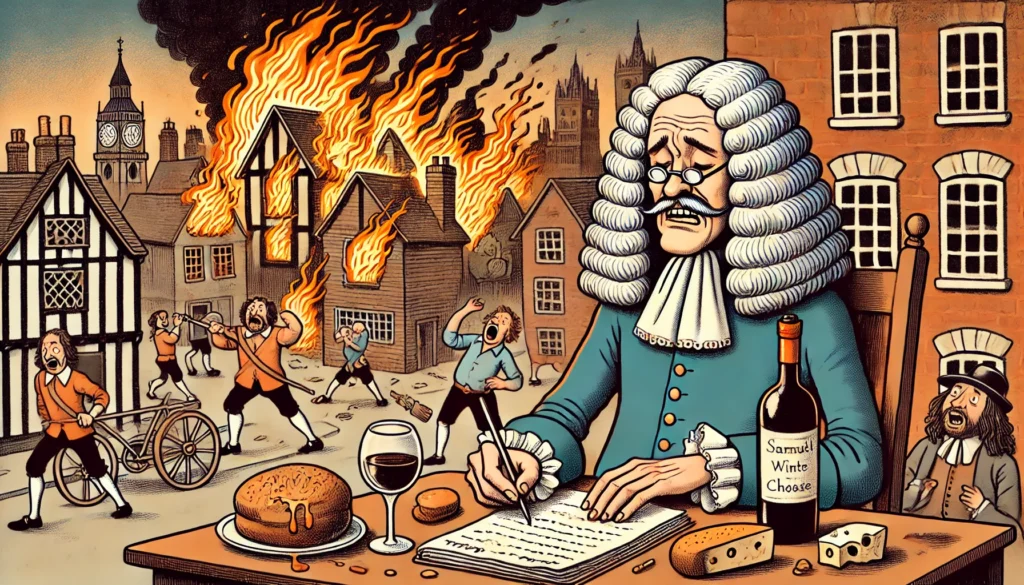
Historical Journals and Their Writers
Background on the Journals and Their Writers
Throughout history, personal diaries and journals have provided invaluable glimpses into the minds of great thinkers, explorers, and artists. From grand discoveries to quiet moments of self-reflection, these journals capture the raw emotions and experiences of their time.
Christopher Columbus’ journal details his discovery of the New World—though the indigenous inhabitants might dispute the term. Samuel Pepys, a London bureaucrat, chronicled daily life in 17th-century England, including the Great Fire of London, often with more concern for his wine than public safety. Lewis and Clark documented their perilous expedition across America, often crediting themselves for accomplishments that Sacagawea made possible.
Anne Frank’s diary remains one of the most powerful accounts of World War II, while Captain Robert Falcon Scott’s tragic Antarctic expedition journal records his crew’s slow demise. George Orwell’s wartime reflections foreshadowed the dystopian world he would later immortalize in 1984.
Frida Kahlo’s diary blends art and anguish, much like her paintings. Virginia Woolf’s introspective musings shaped modern literature. Meanwhile, Meriwether Lewis and Albert Einstein documented their adventures—one mapping America, the other mapping the universe (and struggling with chopsticks).
Each of these figures left behind words that continue to inspire, entertain, and—when read with a satirical eye—highlight the humor in even the most profound human experiences.
1. Christopher Columbus’ Journal (October 12, 1492)
“Today, I discovered a brand-new world! Well, technically, the people here already knew about it, but let’s not split hairs. I declared it ‘Spain Junior’ and planted a flag, which means it’s ours now. The locals seemed unimpressed, possibly because I told them they were now ‘Indians.’ They insisted they weren’t, but what do they know? Also, the crew keeps asking when we’ll find gold. I told them to be patient—conquering takes time! In unrelated news, I have no idea how to get back home.”
2. Samuel Pepys’ Diary (September 2, 1666)
“London is on fire. Again. I should probably do something about it, but I’m currently too busy stuffing my wine into a hole in the backyard. Priorities, you see. The king’s men are tearing down houses to stop the flames, which is a bit like curing a headache by decapitation, but who am I to judge? Also, my wig smells like smoke now. Tragedy upon tragedy.”
3. Lewis and Clark Expedition Journals (November 7, 1805)
“After months of trudging through uncharted wilderness, dodging bears, and eating things that should never be eaten, we have finally reached the Pacific Ocean. Clark wept with joy. I wept with exhaustion. Sacagawea rolled her eyes. She’s been saying for weeks, ‘Just follow the river,’ but did we listen? No, we had to make it complicated. Anyway, we are now officially ‘discoverers’ of a place that already has people living here. Manifest destiny is a wild concept.”
4. Anne Frank’s Diary (July 15, 1944)
“People keep saying, ‘Things will get better.’ I’d love to believe them, but have you met people? The world outside is a mess, but inside this annex, it’s mostly hunger and awkward silences. Peter and I had another deep conversation today. By ‘deep,’ I mean we stared at each other until it got uncomfortable. If this war doesn’t end soon, I might have to start charging for therapy sessions. Even in hiding, teenage angst persists.”
5. Captain Robert Falcon Scott’s Diary (March 29, 1912)
“Well, this is awkward. We trekked all the way to the South Pole, only to find a Norwegian flag already planted here. Turns out, Amundsen beat us to it. Fantastic. The crew is slightly frostbitten, morale is low, and the sled dogs have made it clear they think we’re idiots. I wanted to leave a nasty note for Amundsen but couldn’t feel my fingers enough to write. We begin the return journey tomorrow, assuming we don’t freeze into human popsicles first.”
6. George Orwell’s Diary (September 3, 1939)
“Britain has declared war on Germany. Again. We do love our traditions. It feels like we’re living in a dystopian novel, except I haven’t written it yet. I suspect when I do, people will think it’s a warning, but I bet governments will just use it as an instruction manual. I should probably write this idea down before someone else beats me to it. Also, ran out of tea this morning. Dark times indeed.”
7. Frida Kahlo’s Diary (1953)
“Woke up, painted something surreal, cried a little, then painted some more. My spine hurts. My heart hurts. My paintings hurt. The doctors told me to rest, but I told them I’d rather die painting than die bored. They didn’t appreciate that response. Diego was being Diego again—loud, talented, and impossible. I think I’ll paint a self-portrait about it and make my eyebrows extra dramatic for emphasis.”
8. Meriwether Lewis’ Journal (August 18, 1805)
“Met a Shoshone tribe today. They were incredibly kind, which is lucky because we are completely lost. Sacagawea, in what I can only assume was divine intervention, recognized the chief as her long-lost brother. She saved us again. If this expedition ever gets written down, I assume we’ll take most of the credit, but between us, it’s Sacagawea’s show. In other news, I ate a squirrel today. Not bad, but could use seasoning.”
9. Virginia Woolf’s Diary (January 4, 1931)
“Writing is a relentless pursuit of meaning, a constant unraveling of the self, a—oh, who am I kidding, I just spent three hours staring at the wall, thinking about whether a lighthouse is a metaphor for existential despair or just a fancy lamp. Meanwhile, the critics will call it ‘genius’ regardless. I should write a book about how people only pretend to understand literature. Perhaps I’ll name it To the Lighthouse—it sounds poetic enough to be profound.”
10. Albert Einstein’s Travel Diary (1922)
“Currently in Japan. The people are polite, the food is excellent, and I have discovered that physics does not help me with chopsticks. I attempted to explain relativity to a local fisherman today, but he seemed more interested in catching his dinner. Fair enough. Also, someone just told me I look like a ‘mad scientist.’ I pretended to be offended, but honestly, they’re not wrong. Must remember to stick my tongue out in a photo one day—it’ll be hilarious.”

BOHINEY NEWS — A humorous, satirical illustration in the style of Bohiney Inc. featuring Samuel Pepys in 1666 London. The city is engulfed in flames, people are panicking… – satire.info The post Historical Journals and Their Writers appeared first on Bohiney News.
Go to Source
Author: Alan NafzgerSOURCE:
Europe
Asia
Canada
Latin America
Africa -
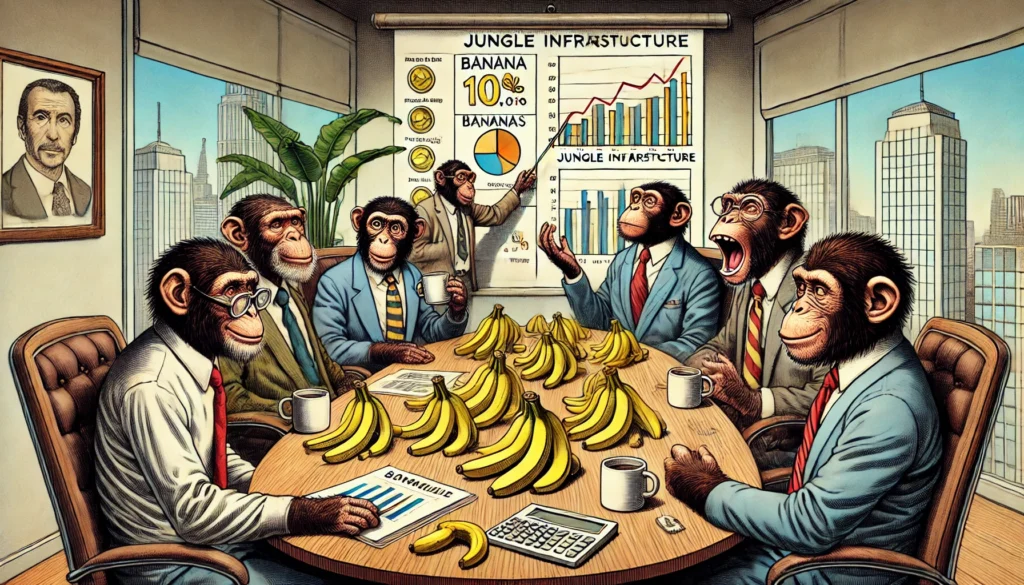
PETA’s Monkey Lawsuit
Go to Source
Author: Alan NafzgerSOURCE:
Europe
Asia
Canada
Latin America
Africa -
Hawk Tuah Girl Haliey Welch Crypto Scam
Hawk Tuah Girl Haliey Welch Crypto Scam
-
Healthcare Gov Rollout Failures
Healthcare Gov Rollout Failures
-
Here Are Five Ways The Universe Could End
Here Are Five Ways The Universe Could End
-
Camp Verde, Texas Comedy Club
Camp Verde, Texas Comedy Club
https://writeablog.net/booksalt64/taylor-swift-and-travis-kelces-future-baby-one-of-the-most-anticipated
3/13/2025 -
Camp Willow, Texas Comedy Club
Camp Willow, Texas Comedy Club
https://stentoftmosley0.livejournal.com/profile
3/13/2025 -
Camp Wood, Texas Comedy Club
Camp Wood, Texas Comedy Club
https://telegra.ph/Taylor-Swift–Travis-Kelces-Future-Baby-One-of-the-most-Anticipated-Newborn-Since-Baby-Jesus-01-21
3/13/2025 -
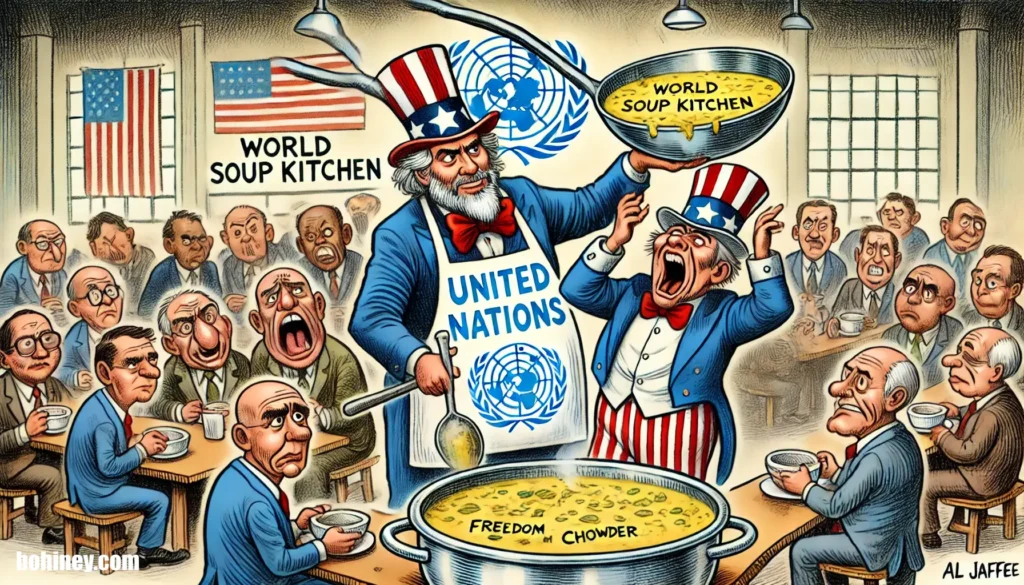
America’s ‘Soup Kitchen’ Status Suspended
America’s ‘Soup Kitchen’ Status Suspended by the United Nations
A Tragic Blow to Global Begging Rights
NEW YORK CITY—In a shocking development, the United Nations has officially suspended America’s long-standing ‘Soup Kitchen’ status, a designation that allowed the United States to freely dispense unsolicited aid, questionable foreign policy advice, and expired MREs to the developing world.
This decision has sent shockwaves through international diplomacy, as leaders worldwide now wonder, “Where will we get our lukewarm servings of democracy and debt restructuring?”
A Nation in Mourning: America Reacts
The White House immediately condemned the UN’s decision, calling it “a direct attack on American generosity and our ability to meddle in international affairs under the guise of humanitarian aid.” In an emotional address, President Biden—after confirming that soup was, in fact, involved—vowed to fight back:
“We have been the world’s soup kitchen since World War II. We have overfed dictators, spoon-fed regimes, and ladled out so much freedom that people are drowning in it. And now they want to take that away? Over my dead bowl of chowder!”
Public reaction has been swift. Americans took to social media to voice their outrage.
“I didn’t serve three tours in the Middle East just to have my tax dollars stop feeding warlords!” tweeted @RealPatriot49.
Another user, @FreedomLadle, lamented, “First, they cancel canned ravioli in school lunches, and now this? What’s next, banning apple pie?!”
Fox News immediately launched a special investigative report titled “The Soup Scandal: How Woke Globalists Are Starving Freedom”, while MSNBC countered with “Did Trump Start This? A Retrospective on Soup-Related Misogyny.”
The UN’s Reasoning: “America’s Soup Is No Longer Edible”
The United Nations justified its decision by citing three major concerns:
- “American Aid Is 90% Condensed” – Reports indicate that foreign nations receiving American aid must dilute it by at least five parts before it becomes digestible. This metaphor was applied both to physical sustenance and U.S. foreign policy.
- “America’s Soup Has Too Many Strings Attached” – Countries accepting U.S. aid often find themselves forced into long-term debt arrangements, regime changes, and sudden influxes of McDonald’s franchises.
- “The Taste of Imperialism Is Overpowering” – Critics claim that American assistance comes with an overwhelming aftertaste of military intervention, cultural imposition, and unsolicited lectures on democracy.
The International Response: Confusion and Hunger
The immediate consequence of America’s “Soup Kitchen” suspension has been widespread global panic. European nations, already struggling with the concept of seasoning their food, now worry about where their next bland-but-reliable batch of American assistance will come from.
Meanwhile, leaders in developing nations expressed confusion and concern.
“We relied on America to give us aid, then invade us when we misused it, and then give us more aid as an apology. It was a perfect cycle!” lamented an anonymous official from a nation that rhymes with “Hraq.”
Even historically critical nations are feeling the void. A North Korean spokesman, speaking under the alias “Definitely Not Kim,” expressed concern:
“If the United States is not sending food aid, how will we fund our anti-American propaganda? Our missile tests run on American rice shipments! This is an act of war.”
China and Russia Celebrate: “Finally, We’re the New Cafeteria!”
China wasted no time capitalizing on America’s loss of Soup Kitchen status. Within hours of the UN’s announcement, Beijing launched a new global food aid initiative called “Xi’s Dumpling Diplomacy,” promising debt-free dumplings to struggling nations.
However, international economists warn that these dumplings come with mysterious contracts mandating 99-year leases on strategic ports and military installations.
Russia, never one to miss an opportunity for geopolitical influence, introduced its own aid alternative called “Borscht and Bullets.” Kremlin spokesperson Dmitry Peskov reassured recipients that Russian food aid would be delivered “with love, only minor poisoning, and maybe a few extra tanks.”
America’s Next Move: “Time to Privatize Foreign Aid”
With its Soup Kitchen privileges revoked, the U.S. government is exploring alternative approaches. A leaked White House memo suggests turning humanitarian aid into a subscription-based service called “AmericaPrime”:
- Basic Plan ($19.99/month) – Includes one box of surplus cornmeal, an autographed copy of The Art of the Deal, and a drone flyover to check for democracy violations.
- Gold Plan ($49.99/month) – Everything in Basic, plus a personal lecture on capitalism from Elon Musk and access to the U.S. Embassy’s food court.
- Platinum Plan ($99.99/month) – Comes with exclusive military protection, one free regime change per year, and a Starbucks.
The Conspiracy Theories: Who Stole Our Ladle?
Naturally, conspiracy theories have emerged, with the most popular being that the UN’s decision was secretly orchestrated by the World Economic Forum as part of the Great Reset Soup Plan (GRSP).
“You take away America’s Soup Kitchen status, and what do you get? People eating bugs and drinking oat milk. This was the plan all along!” raged Tucker Carlson in an emergency livestream titled “Soup’s On: The Globalist Plot to Starve You.”
Meanwhile, Alex Jones claimed that “the global elites have replaced real soup with synthetic lab-grown broth designed to weaken traditional values and make us crave socialism.”
Conclusion: A Nation Without Soup
As America reels from its international demotion, questions remain. Can the country reclaim its status as the world’s most aggressive giver of aid? Will China and Russia’s culinary imperialism go unchecked?
One thing is certain: without American soup, the world is a colder, hungrier, and far less interventionist place.
And perhaps, just maybe, that’s exactly why the UN did it.
Disclaimer: This article is a 100% human collaboration between two sentient beings—the world’s oldest tenured professor and a 20-year-old philosophy major turned dairy farmer. No AI was harmed in the making of this satire, though a few egos might have been.

BOHINEY SATIRE – A satirical political cartoon in the style of Al Jaffee The United Nations, depicted as a stern cafeteria manager, confiscating America’s ‘World Soup… – Alan Nafzger What the Funny People Are Saying…
-
“America losing its Soup Kitchen status is like Gordon Ramsay getting kicked out of a Denny’s. Sure, he’s obnoxious, but where else are you gonna get unlimited refills of bad decisions?” — Ron White
-
“The UN says American aid is ‘too condensed’—which makes sense. We give you democracy, but you gotta add five parts water before it works.” — Jerry Seinfeld
-
“China is already stepping in with ‘Dumpling Diplomacy.’ Of course, the fine print says your grandchildren will still be paying off those dumplings.” — Chris Rock
-
“They said American aid has too many strings attached. Yeah, well, so does my ex, and she’s still getting half my paycheck!” — Dave Chappelle
-
“Russia is now offering a food aid program called ‘Borscht and Bullets.’ You eat, but you also disappear if you ask too many questions.” — Trevor Noah
-
“The UN is like, ‘America, we don’t need your soup anymore.’ Meanwhile, half the world is standing in line, like, ‘Uh, we were just about to get seconds…’” — Bill Burr
-
“America lost its Soup Kitchen status, but don’t worry, we still have the world’s biggest military buffet. It’s all-you-can-invade.” — John Mulaney
-
“The UN says our foreign aid tastes like imperialism. That’s weird because last I checked, imperialism is best served cold, with a side of economic sanctions.” — Samantha Bee
-
“We’re turning aid into a subscription service. For $19.99 a month, you get cornmeal, an Elon Musk lecture, and a complimentary drone flyover. That’s capitalism, baby!” — Hannah Gadsby
-
“No more American soup? How will dictators explain why their people are starving? ‘Uh, yeah, see, we were gonna buy food, but we spent it all on golden palaces and nuclear programs.’” — Jim Gaffigan
-
“If you think losing ‘Soup Kitchen’ status will stop us from meddling, just wait. We’ll still show up at your house uninvited, but now we’ll bring a casserole instead.” — Amy Schumer
-
“First, they cancel America’s soup, next thing you know, the UN will say our ‘Freedom Fries’ are actually just overpriced potato sticks.” — Patton Oswalt

BOHINEY SATIRE – A satirical redesign of the Great Seal of the United States in the style of Al Jaffee. Instead of the traditional eagle holding arrows and an olive branch… – Alan Nafzger The post America’s ‘Soup Kitchen’ Status Suspended appeared first on Bohiney News.
Go to Source
Author: Alan NafzgerSOURCE:
Europe
Asia
Canada
Latin America
Africa -
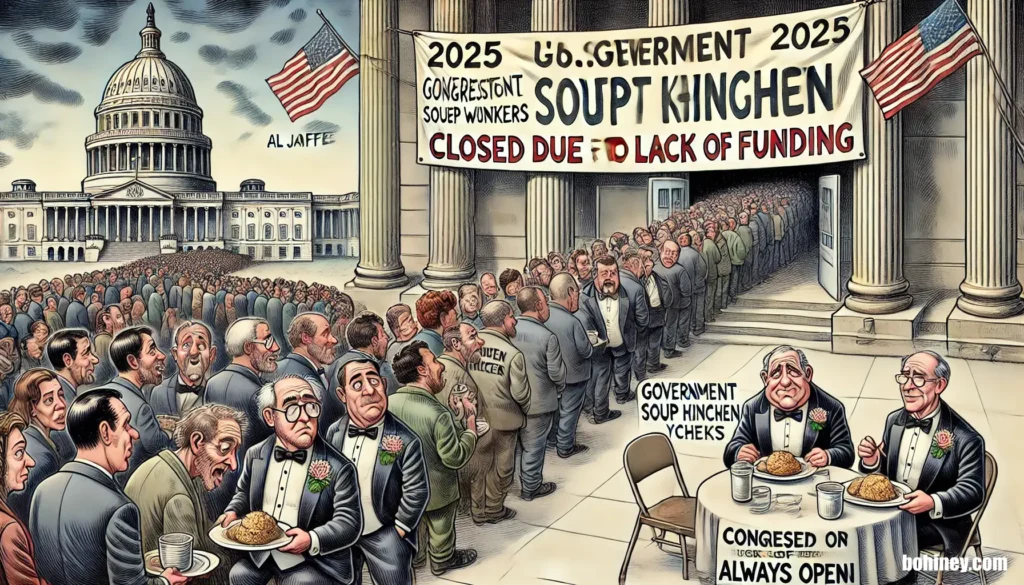
Government Shutdown 2025
Go to Source
Author: Alan NafzgerSOURCE:
Europe
Asia
Canada
Latin America
Africa -

Elon Musk’s Worst Day Ever
Elon Musk’s Worst Day Ever: A Stock Crash, a Cyberattack, and a Memoir Written in Meme Format
The post Elon Musk’s Worst Day Ever appeared first on Bohiney News.
Go to Source
Author: Alan NafzgerSOURCE:
Europe
Asia
Canada
Latin America
Africa -
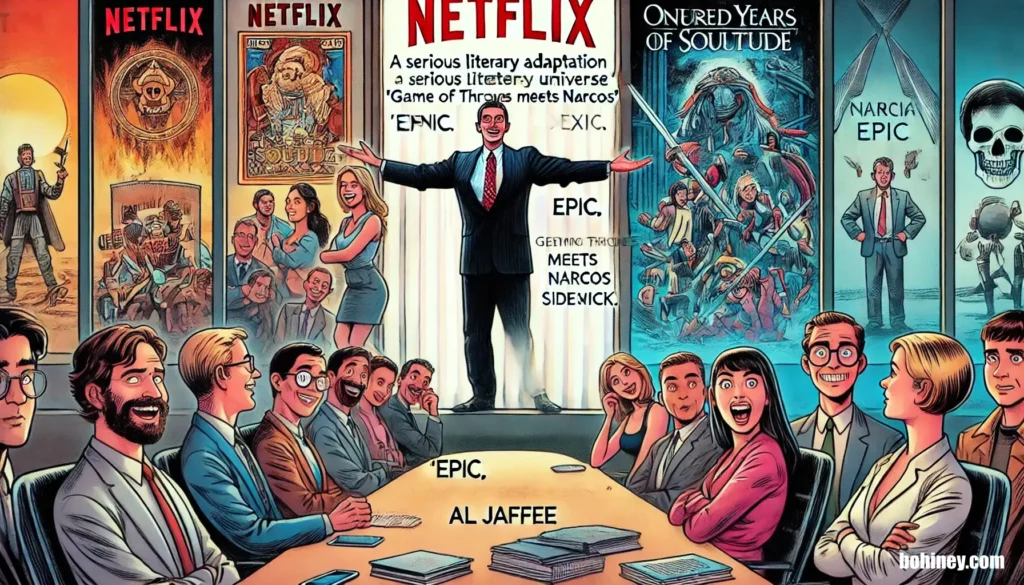
How Confused is Netflix?
Go to Source
Author: Alan NafzgerSOURCE:
Europe
Asia
Canada
Latin America
Africa -
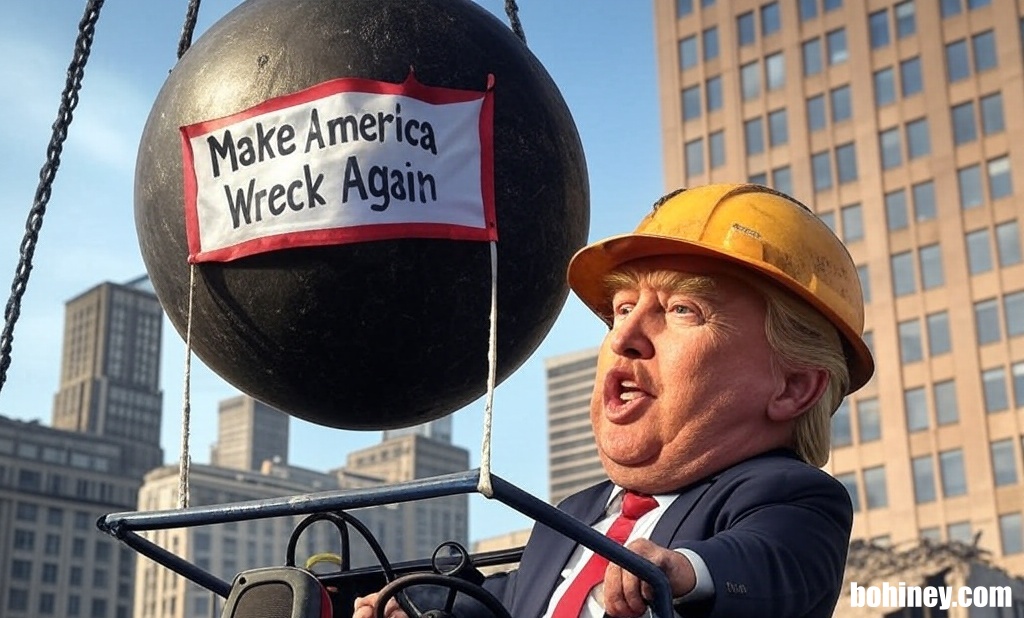
Tariffs Are Just a Tool
Tariffs Are Just a Tool: Like a Hammer, a Wrecking Ball, or a Flamethrower
WASHINGTON, D.C. — In a move that shocked precisely zero people, former President Donald Trump once again used tariffs like a construction worker trying to build a birdhouse with a sledgehammer. This time, his targets? Canada’s dairy industry, the fentanyl trade, and—of course—American patience.
But let’s be clear: tariffs aren’t just some arbitrary punishment. No, no, no. Tariffs are a tool. A sophisticated, precision-guided tool of economic diplomacy—much like how a bazooka is a tool for installing doorknobs.
“Trump uses tariffs like my grandma uses coupons—stack ‘em, slap ‘em everywhere, and hope for a deal.” — Jeff Foxworthy
Leverage or Just a Really Expensive Hobby?
Trump’s approach to tariffs is simple: if you’re not getting what you want, start taxing everything until the other guy cries uncle. It’s like haggling at a flea market but with entire national economies.
“The art of the deal is really about the art of making people very, very uncomfortable.” — Hypothetical Trump Memoir, Chapter 3: Extortion, But Make It Legal.
When Canada refused to budge on their 275% tariff on American dairy products, Trump did what any shrewd businessman would do: slapped tariffs on their steel, aluminum, and maybe even their maple syrup, just in case.
“If you don’t like my prices, I’ll just burn down the store,” said a theoretical business expert who totally exists.
Canadian Cheese Cartel? Say It Ain’t So!
Canada, home of universal healthcare and excessive politeness, might not seem like the type to run an underground dairy mafia, but apparently, they do.
Due to government protections, Canadian farmers have a near-monopoly on milk, making sure their local dairy industry stays profitable while keeping American dairy out. Essentially, they treat milk like OPEC treats oil—except it’s way harder to start a war over mozzarella.
“Tariffs are just Trump’s way of saying, ‘We were losing, so I flipped the Monopoly board.’” — Jerry Seinfeld
Trump, however, was onto them. He didn’t just want a better deal; he wanted to break the Canadian Cheese Cartel once and for all. If that meant driving up the cost of your morning bacon with steel tariffs, so be it.
“You can take my steel, but you’ll never take my lactose intolerance!” — Anonymous Dairy-Free American
Tariffs: The Wall Mexico Never Paid For
Another justification for tariffs? The good ol’ War on Drugs—a war that, much like the actual War on Drugs, involves a lot of shouting and very few victories.
Trump justified tariffs against China by arguing that they enabled the illegal fentanyl trade—which, to be fair, they kinda did. But he also figured that if tariffs could fix drug trafficking in China, surely they could fix it in Canada too.
So, naturally, he taxed Canadian steel because, as we all know, the first thing fentanyl smugglers do is forge themselves a brand-new bridge.
“You see, by making construction materials more expensive, we’re making it harder for drug dealers to build their secret underground lairs.” — Someone Who Definitely Knows How Smuggling Works
It’s Not Bullying, It’s Negotiation—Trump Style
Trump’s economic philosophy can be summarized as follows: the only way to win a deal is by making the other guy sweat harder than a rookie lawyer in traffic court.
So when Canada refused to lower their dairy tariffs, Trump threw their steel industry in a metaphorical headlock and didn’t let go. Why? Because, as every successful businessman knows, the key to any healthy negotiation is mild extortion.
“Some people negotiate with words. Some negotiate with money. I negotiate with economic catastrophe.” — Trump (probably)
The point isn’t the tariffs themselves. The point is leverage. Trump needed something to threaten Canada with, and since he couldn’t tariff their moose, he went after their steel instead.
A Tool, But What Kind?
So yes, tariffs are a tool. The real question is: are they a hammer, a scalpel, or one of those old, rusty wrenches that snaps off in your hand?
- If they work, Trump looks like an economic mastermind who bent Canada and China to his will.
- If they don’t, America just paid more for steel, farmers got screwed, and Trudeau gets to give smug speeches about free trade.
Either way, tariffs are like a grenade—you pull the pin, and hope the explosion happens in someone else’s backyard.
Helpful Content for Bohiney Readers
How to Use Tariffs in Everyday Life
- Dating Advice: Want a better relationship? Threaten to impose tariffs on your partner’s access to the remote.
- Workplace Negotiation: Boss won’t give you a raise? Implement a 20% “Lazy Employee Surcharge” on all tasks.
- Dealing with Kids: Son won’t eat his vegetables? Slap a 50% tariff on his video game time.
Remember: it’s not manipulation if you call it a “negotiation tool.”
Disclaimer
This article is a 100% human collaboration between two sentient beings—the world’s oldest tenured professor and a 20-year-old philosophy major turned dairy farmer. No AI was harmed in the making of this satire, though Canada’s dairy industry might need a stress ball.

BOHINEY SATIRE – Tariffs are a Tool – Alan Nafzger 15 Observations on Trump Using Tariffs as a Tool
-
Tariffs are just leverage, and Trump knows leverage. He’s the guy who walks into a car dealership and says, “I’ll take the car, but I’m tripling the interest rate until you lower the price.”
-
The man is playing 4D chess while everyone else is playing Go Fish. Canada thought they could just sit on their dairy empire, but Trump flipped the whole trade table.
-
Everyone cries about “trade wars,” but guess what? America was already in one—we just weren’t fighting back. Trump showed up like an uncle at Thanksgiving who finally calls out the cheap wine.
-
China was eating America’s lunch for decades—Trump just sent the check back to their table. “Yeah, we’re not covering this. And by the way, that dish comes with a tariff.”
-
People say Trump’s tariffs hurt America, but they never mention how they also hurt our competitors. It’s like complaining that the other football team has to run extra laps, too.
-
Before Trump, U.S. leaders just let foreign countries walk all over them. Trump took one look at Canada’s milk cartel and said, “Not on my watch, Justin.”
-
Trump understands that trade is about power, not politeness. If America is the economic heavyweight champ, why are we letting featherweights push us around?
-
A tariff is just an economic consequence for bad behavior. You speed, you get a ticket. You exploit America’s open markets? Boom. Tariff.
-
Trump wasn’t just negotiating with China, he was disciplining them. If they wanted to keep cheating on trade, they were gonna have to pay for it—literally.
-
Every businessman knows you don’t start a deal by being nice—you start by making the other guy sweat. Trump took the same strategy to international trade, and suddenly, the world was paying attention.
-
“But tariffs raise prices!” Yeah? And so does getting ripped off for decades. Would you rather pay an extra 10 cents on a Coke or let China own every U.S. factory?
-
When Trump put tariffs on Canada’s steel, they called it unfair. But what was unfair was the U.S. letting them overcharge for dairy while dumping their metal on us.
-
Trump used tariffs the way a master poker player uses a bluff. Everyone freaked out, but in the end, they folded first.
-
Tariffs weren’t the problem—they were the solution. They forced Canada, China, and Mexico to come to the table and admit, “Fine, okay, you got us. Let’s make a real deal.”
-
Trump didn’t believe in free trade—he believed in fair trade. And sometimes, the only way to make trade fair is to grab a baseball bat (or, in this case, tariffs) and even the score.

BOHINEY SATIRE – Tariffs are a Tool- Alan Nafzger What the Funny People Are Saying…
Comedians on Trump Using Tariffs as a Tool
-
“People say tariffs are bad for business, but you know what’s worse? Letting Canada sell us milk like it’s a Louis Vuitton handbag.” — Chris Rock
-
“Trump’s negotiation style is simple: walk in, set something on fire, and then say, ‘Now let’s talk.’” — Dave Chappelle
-
“If tariffs are a tool, Trump is using them like a guy who just discovered a chainsaw and is ‘fixing’ everything.” — Bill Burr
-
“Trump put tariffs on steel to stop drug trafficking. That’s like banning spoons to stop obesity.” — Kevin Hart
-
“You think free trade is fair? That’s like showing up to a fistfight where the other guy has brass knuckles and you’ve got a participation ribbon.” — Sebastian Maniscalco
-
“Trump treats international trade like a bad relationship—if you take advantage of him, he’s keying your economy.” — Ron White
-
“Tariffs are like a cover charge at a club. Canada’s been sneaking in through the side door for decades, and Trump finally hired a bouncer.” — Larry the Cable Guy
-
“He tariffed Canada’s steel to get a better dairy deal. That’s like punching your neighbor’s dog because his Wi-Fi is too strong.” — Trevor Noah
-
“People say tariffs hurt consumers. Yeah? So does letting other countries rob you blind. It’s the economic version of ‘stop hitting yourself.’” — John Mulaney
-
“If Trump ran a lemonade stand, he’d charge the neighbor kids a tariff just to cross the street.” — Jim Gaffigan
-
“Trump doesn’t believe in free trade. He believes in ‘This was free until I caught you stealing.’” — Tom Segura
-
“Trade deals with Trump are like gym memberships—you sign up thinking you’re getting a deal, but suddenly, you owe him $40 billion a year.” — Joe Rogan
-
“Trump put tariffs on China like a dad punishing his kid: ‘If you can’t share your toys fairly, NO ONE gets to play.’” — Adam Sandler
The post Tariffs Are Just a Tool appeared first on Bohiney News.
Go to Source
Author: Alan NafzgerSOURCE:
Europe
Asia
Canada
Latin America
Africa -
Hamas Officially Declared A Cowardly Organization
Hamas Officially Declared A Cowardly Organization



 will take over the streets and demand everyone invest in
will take over the streets and demand everyone invest in 







 ” before vanishing into a Tesla Roadster and speeding away into a financial black hole.
” before vanishing into a Tesla Roadster and speeding away into a financial black hole.

 Change the setting to
Change the setting to